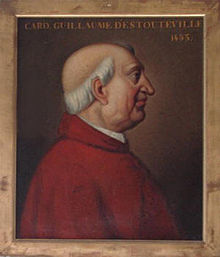Guillaume d’Estouteville
|
Cardinal Guillaume d'Estouteville |
|
|---|---|
| Cardinal-Priest Cardinal-Bishop |
|
 |
|
| Church | San Martino ai Monti (1440-1459) |
| Diocese |
Porto (1459-1461) Ostia (1461-1483) |
| Orders | |
| Created Cardinal | 18 December 1439 by Pope Eugene IV |
| Personal details | |
| Born | 1412 Normandy, FR |
| Died | 22 January 1483 Rome |
| Buried | S. Agostino, Rome |
| Nationality | French |
| Parents | Jean d'Estouteville, Sieur de Vallemont Marguerite d'Harcourt |
| Spouse | Girolama Togli |
| Occupation | diplomat, courtier |
| Profession | bishop |
| Education | Master of Arts, Canon Law |
Guillaume d'Estouteville, (ca. 1412–1483) was a French aristocrat of royal blood who became a leading bishop and cardinal. He held a number of Church offices simultaneously. He conducted the reexamination of the case of Jeanne d'Arc and exonerated her of the charges against her. He reformed the Statutes of the University of Paris. In Rome he became one of the most influential members of the Curia, as the official Protector of France in church business. Pope Sixtus IV appointed him Chamberlain of the Holy Roman Church (Camerlengo). His great wealth allowed him to be a generous patron of the arts, especially in the building and adornment of churches.
D'Estouteville was born ca. 1412 in either Valmont or Estouteville-Écalles in the Duchy of Normandy, a member of the most powerful family in the region. His father, Jean d'Estouteville, Sieur de Vallemont and Grand Chamberlain of France, had fought at Agincourt, was captured, and spent twenty years as a prisoner of war. His mother was Marguerite d'Haricourt, the daughter of Catherine de Bourbon, the sister of Johanna de Bourbon who was the wife of King Charles V of France. Guillaume had an elder brother Louis, who became Grand Bouteiller of France. As the custom was, the younger brother was destined for a career in the Church. The family lost a great deal of property and income as a result of the English occupation of Normandy after the Battle of Agincourt. A collateral ancestor (uncle?), also called Guillaume d'Estouteville, had been Bishop of Évreux (1375–1376) at the age of twenty, Bishop of Auxerre (1376–1382), and Bishop of Lisieux (1382–1415).
It was first said by Alfonso Chacon, and often repeated thereafter, that Guillaume became a Benedictine monk at the Priory of Saint-Martin-des-Champs in Paris, where he soon became prior. Both of these statements, however, have been shown to be mistaken. Documentary evidence written at Saint-Martin in 1500 shows that he was a secular priest, and that he was Administrator of Saint-Martin. Chacon also states that d'Estouteville was Doctor Decretorum (Doctor of Canon Law), but various papal documents of Pope Eugenius IV, in particular one of 1435, calls him a Papal Notary, a relative of the Kings of France, a Master of Arts, and of Canon Law, having passed rigorous examinations. Henri Denifle states that d'Estouteville's degree in Canon Law did not come from the University of Paris. Guillaume did possess a Canonry in the Church of Évreux, and in 1432 he was Canon in Lyon as well. In 1433 he became Canon in Angers.
...
Wikipedia
